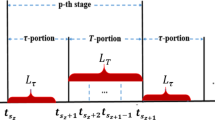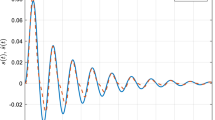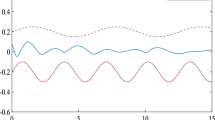Abstract
An observer-based fault-tolerant control method is proposed for a linear system with sensor saturation constraint. Considering the linear system with simultaneous actuator faults and sensor faults, the sensor saturation would bring the output measurement error of the system, which would result in the estimation performance degradation. Firstly, the intermediate estimator is modified to estimate the system states and fault signals at the simultaneous time, and the fault-tolerant controller is designed based on the estimation to compensate the effect of actuator faults effectively. Through Lyapunov stability analysis, the sufficient conditions are obtained to ensure the states of closed-loop system to be uniformly ultimately bounded. The effect of sensor saturation error can be suppressed by adjusting some specified parameters directly without introducing any performance index. Finally, the effectiveness and superiority of the proposed method are verified by a simulation example.
Similar content being viewed by others
References
Z. Gao, Z. Zhou, G. Jiang, M. Qian, and J. Lin, “Active fault tolerant control scheme for satellite attitude systems: multiple actuator faults case,” International Journal of Control, Automation and Systems, vol. 16, no. 4, pp. 1794–1804, August 2018.
F. Chen, D. Lu, and X. Li, “Robust observer based fault-tolerant control for one-sided Lipschitz Markovian jump systems with general uncertain transition rates,” International Journal of Control, Automation and Systems, vol. 17, no. 7, pp. 1614–1625, July 2019.
L. B. Wu, J. H. Park, and N. N. Zhao, “Robust adaptive fault-tolerant tracking control for nonaffine stochastic nonlinear systems with full-state constraints,” IEEE Trans. on Cybernetics, 2019. DOI: https://doi.org/10.1109/TCYB.2019.2940296
J. H. Park, H. Shen, X. H. Chang, and T. H. Lee, Recent Advances in Control and Filtering of Dynamic Systems with Constrained Signals, Springer, Switzerland, 2019.
G. H. Yang and D. Ye, “Distributed fixed-time consensus tracking control of uncertain nonlinear multiagent systems: a prioritized strategy,” IEEE Trans. on Cybernetics, vol. 50, no. 6, pp. 2627–2638, 2020.
Y. Long, J. H. Park, and D. Ye, “Finite frequency fault detection for a class of nonhomogeneous Markov jump systems with nonlinearities and sensor failures,” Nonlinear Dynamics, vol. 96, no. 1, pp. 285–299, January 2019.
X. Wang and G. H. Yang, “Fault-tolerant consensus tracking control for linear multiagent systems under switching directed network,” IEEE Trans. on Cybernetics, vol. 50, no. 5, pp. 1921–1930, 2020.
D. Ye and T. Zhang, “Summation detector for false data-injection attack in cyber-physical systems,” IEEE Trans. on Cybernetics, vol. 50, no. 6, pp. 2338–2345, 2020.
H. Y. Li, H. J. Gao, P. Shi, and X. D. Zhao, “Fault-tolerant control of Markovian jump stochastic systems via the augmented sliding mode observer approach,” Automatica, vol. 50, no. 7, pp. 1825–1834, July 2014.
T. Guo and Y. J. Liang, “Adaptive decentralized fault-tolerant control for uncertain nonlinear time-delay Large scale systems,” Acta Automatica Sinica, vol. 43, no. 3, pp. 486–492, March 2017.
L. B. Wu, G. H. Yang, and D. Ye, “Robust adaptive fault-tolerant control for linear systems with actuator failures and mismatched parameter uncertainties,” IET Control Theory and Applications, vol. 8, no. 6, pp. 441–449, April 2014.
X. Z. Jin, G. H. Yang, X. H. Chang, and W. W. Che, “Robust fault-tolerant H∞ control with adaptive compensation,” Acta Automatica Sinica, vol. 39, no. 1, pp. 31–42, January 2013.
R. Yang, P. Shi, and G. P. Liu, “Filtering for discrete-time networked nonlinear systems with mixed random delays and packet dropouts,” IEEE Trans. on Automatic Control, vol. 56, no. 11, pp. 2655–2660, November 2011.
H. Ma, Q. Zhou, L. Bai, and H. Liang, “Observer-based adaptive fuzzy fault-tolerant control for stochastic nonstrict-feedback nonlinear systems with input quantization,” IEEE Trans. on Systems, Man, and Cybernetics: Systems, vol. 49, no. 2, pp. 287–298, February 2019.
C. C. Wang and G. H. Yang, “Prescribed performance adaptive fault-tolerant tracking control for nonlinear time-delay systems with input quantization and unknown control directions,” Neurocomputing, vol. 311, pp. 333–343, October 2018.
X. L. Wang and G. H. Yang, “Fault detection for T-S fuzzy systems with past output measurements,” Fuzzy Sets and Systems, vol. 365, pp. 98–115, May 2019.
J. You, S. Yin, and H. R. Karimi, “Filtering for discrete fuzzy stochastic time-delay systems with sensor saturation,” Mathematical Problems in Engineering, vol. 2013, pp. 1–10, March 2013.
D. R. Ding, Z. D. Wang, B. Shen, and H. S. Shu, “H∞ state estimation for discrete-time complex networks with randomly occurring sensor saturations and randomly varying sensor delays,” IEEE Trans. on Neural Networks and Learning Systems, vol. 23, no. 5, pp. 725–736, May 2012.
Y. Y. Cao, Z. L. Lin, and B. M. Chen, “An output feedback H∞ controller design for linear systems subject to sensor nonlinearities,” IEEE Trans. on Circuits and Systems I: Fundamental Theory and Applications, vol. 50, no. 7, pp. 914–921, August 2003.
Z. Zuo, J. Wang, and L. Huang, “Output feedback H∞ controller design for linear discrete-time systems with sensor nonlinearities,” IEE Proceedings-Control Theory and Applications, vol. 152, no. 1, pp. 19–26, February 2005.
Z. D. Wang, D. W. C. Ho, H. L. Dong, and H. J. Gao, “Robust H∞ finite-horizon control for a class of stochastic nonlinear time-varying systems subject to sensor and actuator saturations,” IEEE Trans. on Automatic Control, vol. 55, no. 7, pp. 1716–1722, August 2010.
Y. Xiao, Y. Cao, and Z. Lin, “Robust filtering for discrete-time systems with saturation and its application to trans-multiplexers,” IEEE Trans. on Signal Processing, vol. 52, no. 5, pp. 1266–1277, June 2004.
B. Shen, Z. D. Wang, H. S. Shu, and G. L. Wei, “H∞ filtering for nonlinear discrete-time stochastic systems with randomly varying sensor delays,” Automatica, vol. 45, no. 4, pp. 1032–1037, April 2009.
J. L. Liang and W. X. Zheng. “Distributed state estimation for sensor networks with randomly occurring sensor saturations,” Proceedings of the IEEE International Symposium on Circuits and Systems, pp. 2305–2308, 2014.
J. W. Zhu and G. H. Yang, “Fault-tolerant control for linear systems with multiple faultds and disturbances based on augmented intermediate estimator,” IET Control Theory and Applications, vol. 11, no. 2, pp. 164–172, October 2017.
L. Sun, and G. Sun, “Robust adaptive saturated fault-tolerant control of autonomous rendezvous with mismatched disturbances,” International Journal of Control, Automation and Systems, vol. 17, no. 11, pp. 2703–2713, November 2019.
J. W. Zhu and G. H. Yang, “Fault accommodation for linear systems with time-varying delay,” International Journal of Systems Science, vol. 48, no. 2, pp. 316–323, May 2017.
L. Chen, X. Li, W. Xiao, P. Li, and Q. Zhou, “Fault-tolerant Control for uncertain vehicle active steering systems with time-delay and actuator fault,” International Journal of Control, Automation and Systems, vol. 17, no. 9, pp. 2234–2241, September 2019.
J. W. Zhu, G. H. Yang, H. Wang, and F. L. Wang, “Fault estimation for a class of nonlinear systems based on intermediate estimator,” IEEE Trans. on Automatic Control, vol. 61, no. 9, pp. 2518–2524, January 2016.
Author information
Authors and Affiliations
Corresponding author
Additional information
Publisher’s Note Springer Nature remains neutral with regard to jurisdictional claims in published maps and institutional affiliations.
Recommended by Editor Jessie (Ju H.) Park. This work was supported in part by the National Natural Science Foundation of China under Grant 61803334, in part by the Zhejiang Provincial Natural Science Foundation of China under Grant LQ18F030012, in part by the State Scholarship Fund of China Scholarship Council under Scholarship 201908330040.
Jun-Wei Zhu received his B.S. degree in Control Theory and Engineering from Northeastern University, China, in 2008, his M.S. degree in Control Theory and Engineering from Shenyang University, China, in 2011, and his Ph.D. degree in Control Theory and Engineering from Northeastern University, China, in 2016. Currently, he is a special-termed Associate Professor at the College of Information Engineering, Zhejiang University of Technology. He is also a visiting professor of the Institute for Automatic Control and Complex Systems (AKS), University of Duisburg-Essen, Germany, from September 2019 to September 2020. His research interests include cyber-physical systems, fault diagnosis and fault tolerant control.
Qiao-Qian Zhou received her B.Eng. degree in electrical engineering and automation from Ningbo University of Technology, Ningbo, China, in 2016. She is currently pursuing a Ph.D. degree with the College of Information Engineering, Zhejiang University of Technology, Hangzhou, China.
Jian-Ming Xu received his B.S. degree in engineering from Nanchang University in 1998, and his M.S. and Ph.D. degrees from Zhejiang University of Technology, Hangzhou, China. He is currently a Professor in the College of Information Engineering, Zhejiang University of Technology, China. His current research interests include robot control and planning, fault detection.
Jian-Wei Dong received his B.Eng. degree in automation from Suzhou University, Suzhou, China, in 2016. He is currently pursuing a Ph.D. degree with the College of Information Engineering, Zhejiang University of Technology, Hangzhou, China.
Rights and permissions
About this article
Cite this article
Zhu, JW., Zhou, QQ., Xu, JM. et al. Fault-tolerant Control for Linear System Under Sensor Saturation Constraint. Int. J. Control Autom. Syst. 19, 20–28 (2021). https://doi.org/10.1007/s12555-019-0941-4
Received:
Revised:
Accepted:
Published:
Issue Date:
DOI: https://doi.org/10.1007/s12555-019-0941-4




